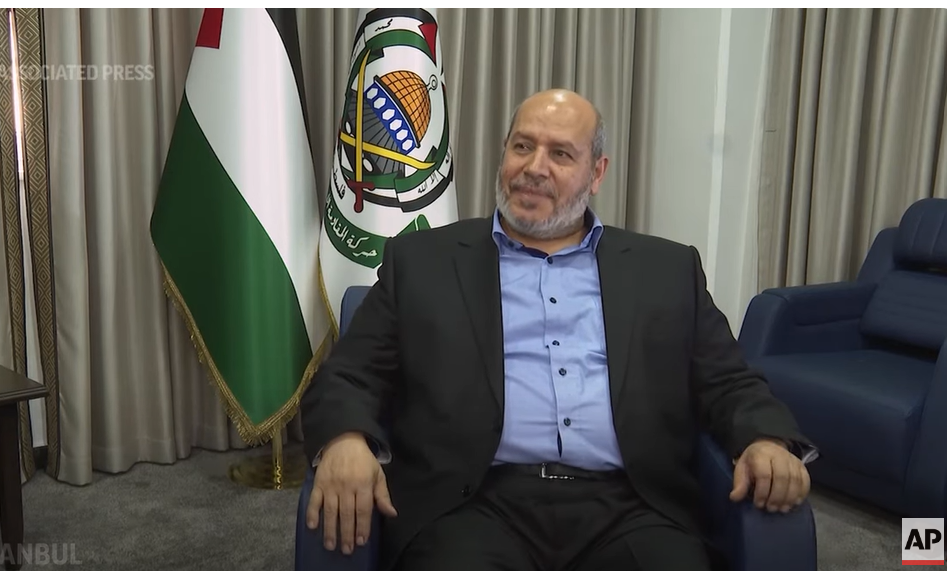Khalil al-Hayya, a top Hamas political official, told The Associated Press in an interview on Wednesday that the Islamic militant group is willing to agree to a truce of five years or more with Israel and that it would lay down its arms and convert into a political party if an independent Palestinian state is established along pre-1967 borders.
Is this a meaningful development or does it remain in the realm of the barely hypothetical?
While the suggestion that Hamas would disarm may appear to be a significant concession by the militant group, it does not bear much credibility since its political program still officially “rejects any alternative to the full liberation of Palestine, from the river to the sea” — referring to the area reaching from the Jordan River to the Mediterranean Sea, which includes lands that now make up Israel.
At the same time, Israel is highly unlikely to consider such a proposal as it has vowed to crush Hamas following the deadly Oct. 7 attacks that triggered the war, and its current leadership under Netanyahu and the hardline Likud party is unyieldingly opposed to the creation of a Palestinian state on lands Israel captured in the 1967 Mideast war.
Indeed, since the war started, Israeli settlements on land vacated by Palestinians have proliferated alarmingly and continue to do so. In January 2024, at a conference organized by the right-wing Nahala organization, dubbed “Settlement Brings Security and Victory”, several members of the Israeli government joined a far-right conference in urging new Jewish settlements to be built in the Gaza Strip itself, as well as the occupied West Bank.
Given the two diametrically opposed goals and policies by Palestinian authorities and the Israeli government, there is little chance that a definitive solution could be reached despite the rhetoric meant to promise any hope.
Speaking to the AP in Istanbul, Al-Hayya said Hamas wants to join the Palestine Liberation Organization, headed by the rival Fatah faction, to form a unified government for Gaza and the West Bank. He said Hamas would accept “a fully sovereign Palestinian state in the West Bank and Gaza Strip and the return of Palestinian refugees in accordance with the international resolutions,” along Israel’s pre-1967 borders.
If that happens, he said, the group’s military wing would dissolve. There was no immediate reaction from Israel or the Palestinian Authority to Al-Hayya’s statement. While the international community overwhelmingly supports such a two-state solution, Israeli Prime Minister Benjamin Netanyahu’s hard-line government rejects it.
The Israeli bombardment and ground offensive in Gaza has killed more than 34,000 Palestinians, most of them women and children, according to local health authorities, and displaced some 80% of Gaza’s population of 2.3 million.
Far from scaling down the conflict, Israel is now preparing for an offensive in the southern city of Rafah, where more than one million Palestinians are sheltering in conditions that are unsustainable.
As Israel has maintained throughout its relentless expansion of the war against Hamas, it argues that a Rafah offensive is necessary to achieve victory over the terrorist organization.
Al-Hayya sees such an offensive as futile, it would not succeed in destroying Hamas. He said contacts between the political leadership outside and military leadership inside Gaza are “uninterrupted” by the war and “contacts, decisions and directions are made in consultation” between the two groups.
Israeli forces “have not destroyed more than 20% of (Hamas’) capabilities, neither human nor in the field,” he asserted. “If they can’t finish (Hamas) off, what is the solution? The solution is to go to consensus.”
The two sides have reached a stalemate: according to Al-Hayyas, Hamas will not back down from its demands for a permanent cease-fire and full withdrawal of Israeli troops, while at the same time Israel says it will continue military operations until Hamas is definitively defeated and will retain a security presence in Gaza afterwards.
In the face of such intransigence on both sides and the unbridgeable conditions both sides impose, Al-Hayya’s proposal is less than hollow rhetoric; it is just a pipe dream.












